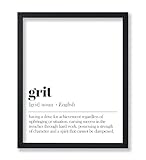Do you believe that grit is only about working harder? Or that it’s an innate trait that some people are just born with? These are just a few of the common myths surrounding grit that may be holding you back from achieving your goals.
Grit is a popular buzzword in the world of personal development and success, but it’s important to understand the truth behind it in order to effectively cultivate it in your own life.
In this article, we’ll explore 7 common myths about grit and why they’re wrong. You’ll learn that grit isn’t just about working harder, it’s not something you either have or don’t have, and it’s not the only factor in success.
By dispelling these myths, you’ll be able to better understand what it takes to develop grit and persevere through challenges. So let’s dive in and uncover the truth about grit.
Key Takeaways
- Grit is not just about working harder, but also involves both persistence and flexibility.
- Developing a growth mindset is key to developing grit.
- Grit can be developed and strengthened over time with intentional effort and practice.
- Grit is important, but it’s not the only factor that contributes to success, and external factors such as economic disadvantage or discrimination can hinder progress.
Myth #1: Grit is Just About Working Harder
So, you may believe that grit is just about working harder, but let me tell you, that’s not entirely true.
While hard work is certainly a crucial aspect of grit, it’s not the only one. Grit is about persevering through challenges and setbacks, but it’s also about finding a balance between pushing yourself and taking care of yourself.
In other words, grit involves both effort and self-care. The importance of balance is often overlooked when it comes to grit. If you’re constantly pushing yourself to work harder and harder, without taking time to rest and recharge, you’re likely to burn out.
True grit involves knowing when to push yourself and when to take a step back. Additionally, there are different types of grit. For example, there’s ‘stamina’ grit, which involves being able to persevere through long-term challenges, and ‘urgency’ grit, which involves being able to respond quickly and effectively to short-term challenges.
So, while hard work is certainly important, it’s not the only aspect of grit, and finding a balance between effort and self-care is crucial for building true grit.
Myth #2: Grit is Innate
You may have heard the myth that grit is innate, but that’s simply not true. Grit can be developed with effort and practice, just like any other skill.
The key to developing grit lies in the right mindset, which involves a focus on growth and perseverance.
How Grit Can Be Developed
Are you ready to cultivate your grit and achieve your goals? Good news – grit is not something that you either have or you don’t. It can be developed and strengthened over time with intentional effort and practice. Here are some ways you can start building your grit:
| Ways to Develop Grit | Examples |
|---|---|
| Set clear goals | "I will run a 5k in 3 months." |
| Practice resilience | "I will bounce back from failure by trying again." |
| Embrace challenges | "I will take on a new project that pushes me out of my comfort zone." |
| Seek feedback | "I will ask for constructive criticism to improve." |
| Keep a growth mindset | "I believe my abilities can be developed through hard work and dedication." |
It’s important to note that developing grit doesn’t have to be a solitary journey. The support and encouragement of others can be instrumental in helping you achieve your goals. Surround yourself with people who believe in you and your abilities, and who will challenge you to keep pushing forward. Additionally, cultivating grit in team dynamics can lead to a more resilient and successful group. By working towards a common goal, supporting each other through challenges, and sharing feedback and growth opportunities, a team can build a culture of grit and achieve great things together.
The Role of Mindset
Don’t underestimate the power of mindset when it comes to developing grit. Having a growth mindset can make all the difference in achieving your goals.
A growth mindset is the belief that your abilities can be developed through hard work and dedication. On the other hand, a fixed mindset is the belief that your abilities are fixed and cannot be changed.
Your self-perception has a significant impact on your perseverance, resilience, passion, determination, and mental toughness. When you have a failure mindset, you view failures as a reflection of your abilities and tend to give up easily.
On the other hand, when you have a success mindset, you view failures as opportunities to learn and grow. This mindset helps you bounce back from setbacks and stay motivated to achieve your goals.
Developing a growth mindset takes time and effort, but it’s worth it. By changing your self-perception and embracing challenges, you can develop mental toughness and resilience to overcome obstacles and achieve your goals.
Myth #3: Grit Means Never Giving Up
Actually, believing that grit means never giving up is a common misconception. In reality, having grit includes the importance of flexibility. True grit involves being able to adapt and adjust your approach when necessary. It’s not about stubbornly sticking to the same strategy, even when it’s not working.
Here are three key ways that grit differs from perseverance:
-
Perseverance involves persisting despite obstacles, while grit also includes changing course when needed.
-
Grit involves a long-term commitment to a goal, while perseverance may only require short-term persistence.
-
Grit requires both passion and perseverance, while perseverance may only require the latter.
So, don’t be fooled by the myth that grit means never giving up. True grit involves both persistence and flexibility, knowing when to push forward and when to change direction.
Myth #4: Grit is Only for Individuals
You may have thought that grit is only something individuals possess, but that’s not entirely true.
While it’s true that grit is often associated with individual perseverance and determination, it’s equally important in teams. In fact, grit can be the difference between a team that succeeds and one that fails.
A team with members who possess grit is more likely to push through challenges and setbacks, and ultimately achieve their goals.
Furthermore, grit is also important in education. Students who possess grit are more likely to stick with difficult tasks and persevere through challenges. They’re also more likely to bounce back from failures and setbacks, and ultimately achieve academic success.
Teachers can help foster grit in their students by providing opportunities for challenge and growth, and by encouraging a growth mindset.
By recognizing the importance of grit in both individual and team success, we can work together to cultivate this valuable trait in ourselves and others.
Myth #5: Grit is Only Relevant in Certain Fields
Now that you’ve learned that grit isn’t just for individuals, let’s debunk another common myth about grit – that it’s only relevant in certain fields. This misconception often arises in education. Some people believe that grit is only necessary for students pursuing certain careers or academic paths. However, the truth is that grit has cross-industry applications and is relevant in any field where persistence and perseverance are required.
Studies have shown that grit is a better predictor of success than IQ or talent in a wide range of fields, including business, sports, and the arts. This means that whether you’re a CEO, athlete, or artist, developing your grit can help you overcome challenges, stay motivated, and achieve your goals.
So don’t let the misconception that grit is only relevant in certain fields hold you back. No matter what your career aspirations are, cultivating grit can help you succeed.
Myth #6: Grit is the Only Factor in Success
Don’t make the mistake of thinking that grit is the end-all, be-all factor in achieving success. While having grit is important, it is not the only factor that contributes to success.
Collaboration with others is also crucial in achieving goals. No one person can do everything alone, and working with others can bring new perspectives and ideas to the table.
Moreover, external factors also play a significant role in success. No matter how gritty an individual is, factors such as economic disadvantage or discrimination can hinder their progress.
It’s important to acknowledge that these factors exist and work towards creating a more equitable society. While grit is important, it is not the only factor that contributes to success, and it’s essential to recognize the significance of collaboration and the impact of external factors.
Frequently Asked Questions
What are some other factors besides grit that contribute to success?
You might think that grit is the only thing that determines success, but there are actually other important factors to consider.
Mental health is one of them. If you’re struggling with anxiety, depression, or other mental health issues, it can be difficult to stay motivated and focused on your goals. It’s important to take care of your mental health so that you can stay on track and achieve your objectives.
Another factor to consider is external resources. Even if you have plenty of grit, you may not be able to succeed without the right support and resources. Whether it’s access to education, financial assistance, or a strong support network, having external resources can make all the difference in achieving your goals.
So don’t underestimate the importance of mental health and external resources when it comes to achieving success.
Can grit be developed or is it truly innate?
You may be wondering if grit can be developed or if it’s just something you’re born with. The good news is that research suggests that grit can indeed be cultivated over time, regardless of age.
In fact, grit development may look different in children versus adults. For children, fostering a growth mindset and emphasizing the importance of effort and perseverance can help build grit. Meanwhile, adults may benefit from setting small achievable goals and gradually increasing the level of difficulty.
Additionally, self-esteem plays a crucial role in grit development. Those with higher self-esteem tend to have more resilience and are better equipped to handle setbacks. So, while some may believe grit is solely innate, it’s clear that with effort and practice, anyone can develop this essential trait.
Are there any downsides to having too much grit?
Having too much grit can have potential drawbacks and consequences. While grit is often celebrated for its ability to drive individuals towards achieving their goals, it can also lead to burnout, stress, and neglect of self care and mental health.
It’s essential to strike a balance between being persistent and taking care of yourself. You need to recognize when you’re pushing yourself too hard and when it’s time to take a step back. Remember that grit is not a one-size-fits-all approach. It’s okay to acknowledge your limits and to prioritize your well-being.
Ultimately, developing grit should come with an awareness of its potential negative effects and the importance of balancing it with self care and mental health.
How do different cultural backgrounds and upbringings affect one’s ability to develop grit?
Cultural influences and childhood experiences can have a significant impact on one’s ability to develop grit.
For example, individuals from collectivistic cultures may prioritize group harmony over individual success, which can make it more challenging to persevere through personal challenges.
On the other hand, those from individualistic cultures may have a greater emphasis on personal achievement, which may lead to a greater focus on developing grit.
Childhood experiences such as exposure to adversity and supportive relationships can also shape one’s ability to persevere through difficult situations.
While grit is often touted as a universal trait, it’s important to recognize that cultural and individual differences can play a role in its development.
Is grit more important for achieving personal goals or professional success?
When it comes to achieving personal goals or professional success, grit plays a crucial role. It’s not just about talent, but the willingness to work hard and persevere through challenges that sets successful individuals apart.
Grit allows you to push through difficult times and stay focused on your goals. However, this doesn’t mean that talent is not important. A combination of both talent and grit is often the winning formula.
The role of perseverance cannot be overstated, as it helps you to stay committed to your goals and overcome obstacles along the way. So, whether you’re striving for personal or professional success, cultivating grit is essential for achieving your goals.
Conclusion
So, now you know the truth about grit. It’s not just about working harder or never giving up. It’s not something that only some people are born with, and it’s not only relevant in certain fields.
Grit is a multifaceted trait that can be developed and applied in a variety of settings. Remember, grit is not the only factor in success, but it is an important one.
By understanding the myths and realities of grit, you can work to develop this trait in yourself and help others do the same. So, keep pushing forward, stay resilient, and don’t let any of these myths hold you back from achieving your goals.














































































































